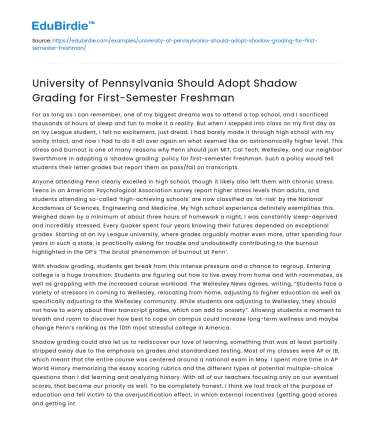For as long as I can remember, one of my biggest dreams was to attend a top school, and I sacrificed thousands of hours of sleep and fun to make it a reality. But when I stepped into class on my first day as an Ivy League student, I felt no excitement, just dread. I had barely made it through high school with my sanity intact, and now I had to do it all over again on what seemed like an astronomically higher level. This stress and burnout is one of many reasons why Penn should join MIT, Cal Tech, Wellesley, and our neighbor Swarthmore in adopting a ‘shadow grading’ policy for first-semester Freshman. Such a policy would tell students their letter grades but report them as pass/fail on transcripts.
Anyone attending Penn clearly excelled in high school, though it likely also left them with chronic stress. Teens in an American Psychological Association survey report higher stress levels than adults, and students attending so-called ‘high-achieving schools’ are now classified as ‘at-risk’ by the National Academies of Sciences, Engineering and Medicine. My high school experience definitely exemplifies this. Weighed down by a minimum of about three hours of homework a night, I was constantly sleep-deprived and incredibly stressed. Every Quaker spent four years knowing their futures depended on exceptional grades. Starting at an Ivy League university, where grades arguably matter even more, after spending four years in such a state, is practically asking for trouble and undoubtedly contributing to the burnout highlighted in the DP’s ‘The brutal phenomenon of burnout at Penn’.
Save your time!
We can take care of your essay
- Proper editing and formatting
- Free revision, title page, and bibliography
- Flexible prices and money-back guarantee
With shadow grading, students get break from this intense pressure and a chance to regroup. Entering college is a huge transition. Students are figuring out how to live away from home and with roommates, as well as grappling with the increased course workload. The Wellesley News agrees, writing, “Students face a variety of stressors in coming to Wellesley, relocating from home, adjusting to higher education as well as specifically adjusting to the Wellesley community. While students are adjusting to Wellesley, they should not have to worry about their transcript grades, which can add to anxiety”. Allowing students a moment to breath and room to discover how best to cope on campus could increase long-term wellness and maybe change Penn’s ranking as the 10th most stressful college in America.
Shadow grading could also let us to rediscover our love of learning, something that was at least partially stripped away due to the emphasis on grades and standardized testing. Most of my classes were AP or IB, which meant that the entire course was centered around a national exam in May. I spent more time in AP World History memorizing the essay scoring rubrics and the different types of potential multiple-choice questions than I did learning and analyzing history. With all of our teachers focusing only on our eventual scores, that became our priority as well. To be completely honest, I think we lost track of the purpose of education and fell victim to the overjustification effect, in which external incentives (getting good scores and getting into good schools) lower intrinsic motivation (learning because you love it).
This is a dangerous phenomenon. Penn seeks to educate future leaders and innovators, and if their students are not truly learning, but rather memorizing information for the sake of a test grade and forgetting it afterwards, they will not succeed. A four-year longitudinal study of seven schools (including Wellesley) indicates that shadow grading could potentially reverse this, making an even stronger case for the policy.
Mandatory shadow grading would also give Quakers a better chance to explore unfamiliar topics of interest. We’re encouraged to do this by pre-major advisors, but the possibility of earning a bad grade or being judged by making the choice to take it pass/fail are deterrents. MIT student Allan Sadun used the low risk provided by shadow grading to take a course in electrical engineering and gained a new job prospect in the process. We are told to explore, so why doesn’t Penn let us do so without drawbacks?
All of shadow grading’s benefits fall under the umbrella of responding to problems caused by high school. The American education system has not let us sufficiently relax, explore, or even learn. We are not arriving on campus prepared to reach our full potential. Since the 9th grade, we have all been on the fast-track to big career dreams, something only compounded by Penn’s intense pre-professional atmosphere. No one wants to slow down lest the person next to them speeds ahead. As a result, many of us are stressed and overworked and may not be making the most of our college experience. Shadow grading would allow everyone to pause, and at a crucial time in our lives, recharge, rediscover, readjust, and reevaluate.






 Stuck on your essay?
Stuck on your essay?

